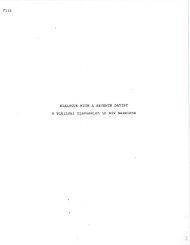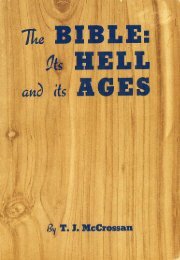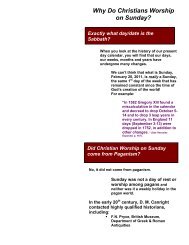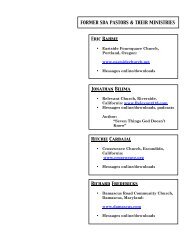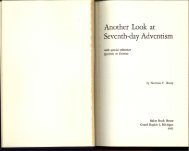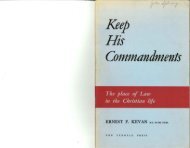Discovering the New Covenant by Greg Taylor - exAdventist Outreach
Discovering the New Covenant by Greg Taylor - exAdventist Outreach
Discovering the New Covenant by Greg Taylor - exAdventist Outreach
You also want an ePaper? Increase the reach of your titles
YUMPU automatically turns print PDFs into web optimized ePapers that Google loves.
DISCOVERING THE NEW COVENANT<br />
Secondly, <strong>the</strong> word John uses for commandments<br />
(entolé in Greek) is never used in John’s writings to refer to<br />
<strong>the</strong> Ten Commandments. When John is speaking of <strong>the</strong> law<br />
in general, or <strong>the</strong> Ten Commandments in particular, he<br />
always uses <strong>the</strong> Greek word nomos for law. When John<br />
uses entolé he does so in conjunction with <strong>the</strong> instructions<br />
of Jesus for practical love of one ano<strong>the</strong>r. He never breaks<br />
this pattern. 3 So Revelation 12:17 is not speaking about <strong>the</strong><br />
Old <strong>Covenant</strong> Ten Commandments at all. We must be<br />
consistent in translating John’s writings if we wish to arrive<br />
at his intended meaning. It became apparent to me that <strong>the</strong><br />
SDA position had not only ignored <strong>the</strong> context of <strong>the</strong> <strong>New</strong><br />
Testament for <strong>the</strong> Seal of God, but had missed <strong>the</strong><br />
consistent use of <strong>the</strong> Greek language <strong>by</strong> <strong>the</strong> writer John.<br />
With this pattern clearly in mind, Revelation 12:17 is<br />
properly translated into English (in harmony with John’s<br />
use of entolé) “those who truly love one ano<strong>the</strong>r, and are<br />
telling <strong>the</strong> world about Jesus.” To translate it to mean <strong>the</strong><br />
observance of law, specifically Sabbath observance, is<br />
reading into <strong>the</strong> text preconceived ideas, ra<strong>the</strong>r than letting<br />
<strong>the</strong> text speak for itself.<br />
The Holy Spirit according to John 13-16 is ano<strong>the</strong>r<br />
Comforter. He lives in us and guides us. He is <strong>the</strong><br />
indwelling Jesus in our lives. The Seal of God in <strong>the</strong> last<br />
days represents those who have a daily personal walk with<br />
Jesus through <strong>the</strong> agency of <strong>the</strong> Holy Spirit. This is what it<br />
means to be sealed. When we receive <strong>the</strong> gift of <strong>the</strong> Holy<br />
Spirit <strong>by</strong> receiving Jesus, we enter <strong>the</strong> daily rest experience<br />
of God’s amazing grace. This is <strong>the</strong> same message as found<br />
in Hebrews 3-4. When we are resting in Jesus today and<br />
every day, He is our Sabbath. The Spirit is <strong>the</strong> guarantee of<br />
our inheritance! (Eph. 4:14) In short, <strong>the</strong> Seal of God is<br />
Jesus living in us through <strong>the</strong> agency of <strong>the</strong> Holy Spirit.<br />
3 Dale Ratzlaff, Sabbath in Crisis (Glendale, AZ, 1990) pp 310-311.<br />
98



